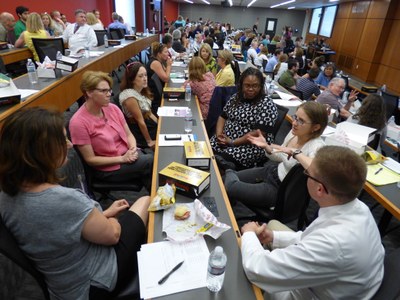Commitment to Community in Research

LGBT Center and Research: Principles and Guidelines
UofL’s LGBT Center frequently partners with other units at UofL on research with LGBTQ+ people and the Louisville LGBTQ+ community. While the LGBT Center is generally not the primary investigator on research projects, we are involved as partners, particularly in community outreach. When working with partner units and organizations on research, the LGBT Center is guided by the principles below.
We provide these principles and guidelines for informational purposes only. The LGBT Center cannot be responsible for research studies, investigators, or participants.
Principles:
- We believe that conducting research with LGBTQ+ people on their lives and experience is important to our mission.
- We believe that the time and expertise of research participants is valuable.
- We believe that research should be intersectional in nature, taking into account how the multiple identities held by participants impacts their lived experience.
- Similarly, we take into account how the intersecting identities held by researcher’s impacts research design and analysis.
- We believe that research should avoid harm to participants, respect the autonomy of participants, safeguard equity and justice throughout the research process, and most importantly ensure the research seeks to benefit as many members of the LGBTQ+ community as possible.
In our research partnerships, we recognize these principles by following these guidelines:
- All research will comply with current IRB protocols.
- In the event that a specific research is not under the purview of the IRB (oral history, curriculum) or the IRB determines that a research project is exempt from their review, it is imperative that appropriate measures are in place to ensure participant privacy and confidentiality and that data storage will be stored securely.
- We strongly recommend that research participants are compensated because their time and expertise is valuable.
- We strongly recommend that members of the community who help researchers with participant recruitment are compensated.
- Every effort should be made to recruit diverse participants (race/ethnicity, gender identity, socioeconomic status, age, ability, etc.), as appropriate for the study.
- Images that reflect the diversity of LGBTQ+ community should be used in recruitment material.
- Language about and directed to potential participants should be inclusive and respectful, particularly with regard to gender identity and sexual orientation.
- When recruiting research participants, we use language approved by the IRB.
- We encourage all studies to include gender identity and sexual orientation in participant demographics. The Williams Institute provides guidance on this. [https://williamsinstitute.law.ucla.edu/wp-content/uploads/geniuss-report-sep-2014.pdf]
Protocol: When the LGBT Center is asked to promote research initiated by other groups
The LGBT Center is generally not able to help individuals and entities outside UofL recruit research participants or advertise research projects, unless this is an organization with which the LGBT Center has a partnership. When the LGBT Center is approached by entities within UofL or outside organizations with which we have a partnership to help promote LGBTQ+-related research and recruit research participants, we can do so only after the PI (Principal Investigator) confirms that the following guidelines have been followed:
- An IRB (of UofL or managing organization) has approved the project. If no IRB is involved, we ask the PI to ensure that appropriate measures have been put into place to ensure participant privacy and confidentiality and that data storage will be stored securely.
- Participants will receive adequate payment for their time and expertise, or the lack of payment is clearly stated.
- Community members who help recruit participants will receive adequate payment for their time and expertise, or the lack of payment is clearly stated.
- Recruitment methods will make serious efforts to include LGBTQ+ people of diverse experiences, as appropriate for the study. For example, studies trying to understand the experiences of LGBTQ+ people in Louisville should do outreach among a diversity of LGBTQ+ communities, particularly those that are marginalized such as low-income people, older adults, and people of color.
- Language about and directed to potential participants should be inclusive and respectful, particularly with regard to gender identity and sexual orientation.
